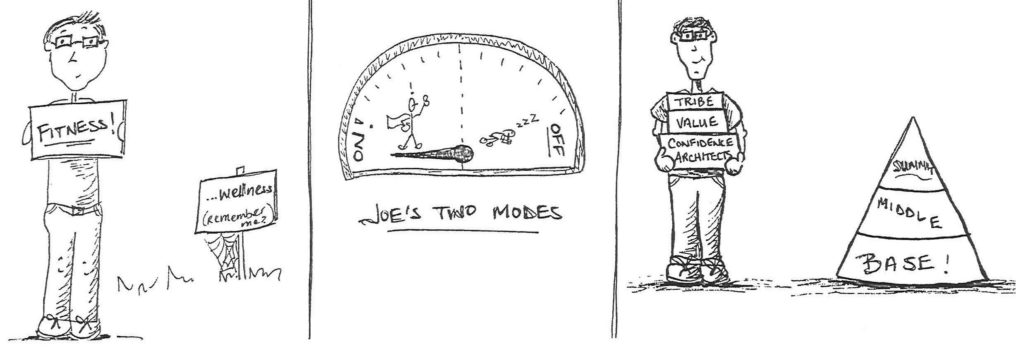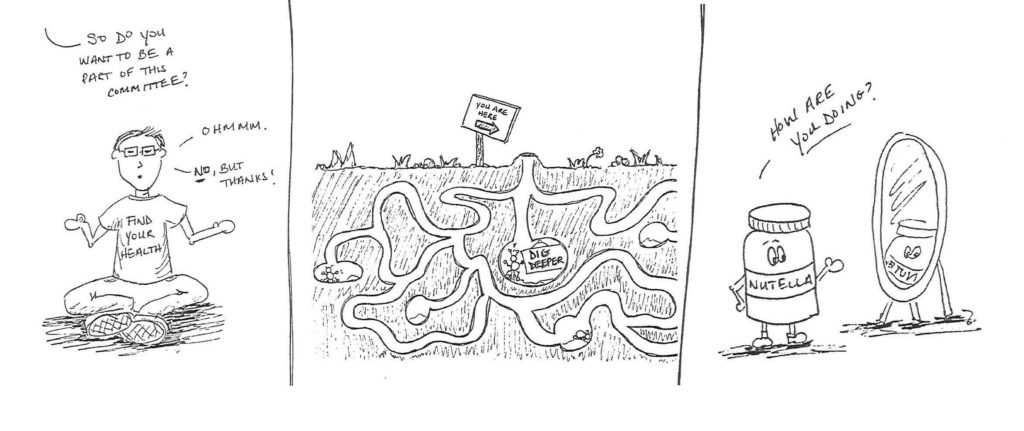by Joe Ginese
“Wow, great job finishing the race! How are your legs?”
“Hey, you look tired. You feeling okay?”
“How are you today?”
Raise your hand if you have ever had someone ask you one of those three questions.
Now raise your hand if your first instinct when asked those questions is to default to how you are physically feeling.
“Thanks, legs are sore but it was worth it.”
“Yeah, I’m fine. Just a late night.”
“I’m good, and you?”
I’d like to share some thoughts with you about how we define our fitness and our wellness. The two go hand in hand in most cases, but while one is embraced and cheered for the other is given a slight head nod and a subtle pat on the back.
As someone who usually operates at extremes, when I am on I am on. I am hitting my flow to the point of a euphoric blackout where I’m not realizing what I am doing or saying. Very little thinking takes place. It is like an out of body experience that feels like nothing else. A perfect example of that is my Pecha Kucha from ACPA. I got off the stage physically shaking with adrenaline and asking myself, “What the heck just happened?!” I hit my flow.
The other end of that extreme is when I am down I am down. No idea sticks. Curiosity quivers in a corner of my mind. My shoulders feel as though they are magnetic and are trying to connect to my toes. Globs of Nutella seem like a good idea no matter the time of day. (Arguably, that isn’t necessarily a sign of being down since globs of Nutella are always a good idea.) Imposter syndrome becomes an ailment that handicaps the slightest bit of motivation or daydreaming.

I point this out because I see a difference in how we support one another with our physical health and how we support one another with our mental health. Both are in the category of wellness yet physical health gets the red carpet while mental health has to sneak in the side door. Physical health within student affairs has Facebook pages, Facebook groups, and a hashtag (#SAfit) while mental health has…an occasional appearance as a topic on a chat poll. This is changing because I think the momentum and attention that #SAcommits has harnessed will serve as the bedrock of these conversations to continue on larger and smaller scales.
The conundrum here is that people don’t know how to talk about wellness in a holistic manner. Student affairs can often be bashed for being martyrs when talking about the hard parts of our responsibilities and duties. We are celebrated when something goes extremely well but not celebrated when something extremely difficult was handled properly. I’m not saying that in place of 13.1, Spartan Race, 5K stickers on your car you should have stickers announcing “I survived a 40 hour shift of residence life duty that included a student death.” What I am saying is that we need to be better at supporting each other, and we need to be empowered and confident enough to build our pyramids of support. You cannot do that without being honest with yourself and with your confidants.
I’m lucky to have friends who on a daily or weekly basis will send a message saying, “How are you doing?” and know they mean it in a deeper way. They aren’t asking it as someone behind the counter asks it as part of a social ritual; they are asking it because they want the truthful answer. Part of that is the luck of meeting great people and the other part of that putting in the effort to build that mutual trust and relationship that fosters that type of care and concern. Those parts are only possible, for me, because I married a partner who taught me how to do both.
Mental wellness workouts mean practicing reflection, gratitude, and peace.These can be done by journaling, letter writing, and shutting off your phone.Mental wellness isn’t just a matter of what you can do, it is also a matter of what you choose NOT to do. You can choose NOT to say yes to that next committee opportunity. You can choose NOT to volunteer to help with an event. You can choose NOT to attend a networking event or social as long as in place of those things you are choosing to do something that refreshes, revitalizes, and/or relaxes you. Our brains are one of our most important muscles, if we work it too hard it can sprain or get pulled. A friend and I like to call this out by declaring, “I have the dumb.” It basically means that you are mentally spent and your brain has stopped functioning on a higher level.

Yes, life is short. Yes, you could/should carpe all the diems, most of the time. Just realize that you have to stop to refresh and renew just like a NASCAR racer has to pit stop for fuel, tires, and adjustments. It is all part of the process and the journey. I mention in my Pecha Kucha that we need to dig deeper with our questions and our networking. Digging deeper means taking conversation beyond the surface, which means not being afraid to ask how someone is mentally handling a situation or celebration and in return, not being afraid to speak up. It also takes time, which means standing still and turning down other things while you sit and dig in.
So grab your Nutella and make some time for someone in your life that may need to hear the question, “How are you really doing?” and be prepared to dig in.
Originally posted at the Student Affairs Collective on May 21, 2014.
